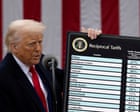
In recent developments, a series of events have emerged that highlight significant shifts in both international trade dynamics and the political landscape of the United States. These changes are centered around tariff proposals on European exports and a notable political realignment domestically within the United States.
The United States has signaled potential changes to its trade policies with Europe that may significantly impact the export of food and farm produce. President Donald Trump has proposed imposing a 17% tariff on such exports from Europe, which would affect a wide range of products. These tariffs could potentially impact popular European goods like Belgian chocolate, Kerrygold butter from Ireland, and olive oils from countries such as Italy, Spain, and France. These products, which enjoy significant popularity within American markets, could face price increases affecting both consumers and importers.
In response to these proposed tariffs, the European Union has expressed a preference for negotiated solutions, aiming to resolve tensions amicably. However, they are also preparing for potential measures to safeguard their economic interests, indicating readiness for a trade war if necessary. The looming threat of tariffs underscores the delicate balance in international trade relations and the need for collaborative dialogue to avoid disruptions that could negatively impact economies on both sides of the Atlantic.
Concurrently, there is a notable shift in the political fabric of the United States. Elon Musk, the CEO of Tesla and SpaceX, has announced the formation of a new political entity called the “Party of America.” This announcement follows a public disagreement with President Trump over budgetary matters, which escalated into a broader rift. Musk’s decision to create a new political party marks a significant development in the American political landscape, potentially attracting individuals seeking alternatives to the traditional Republican and Democratic parties.
Musk’s announcement, made via his social media platform X, emphasized the party’s commitment to restoring what he describes as “freedom” to the American people. This move reflects a broader narrative of political diversification and the emergence of new voices in American politics, speaking to the varied aspirations and concerns of the electorate.
Additionally, a broader reflection on conservatism points to inherent challenges during periods of economic and political instability. Discussions highlight the emergence of unconventional ideas and solutions, a natural byproduct of times when familiar structures seem to shift or diminish. Although these periods can inspire innovation and adaptability, they also warrant mindfulness to avoid unintended consequences.
As these developments unfold, they encapsulate a moment of transition both in global trade policies and domestic political alignments. The potential impact on consumers and businesses, as well as the shifting political allegiances, present a nuanced landscape needing careful navigation. Meanwhile, dialogue and negotiation remain essential to managing these changes positively and constructively, promoting stability and prosperity on both local and international fronts.
Source: {link}
